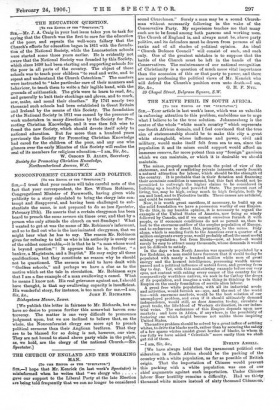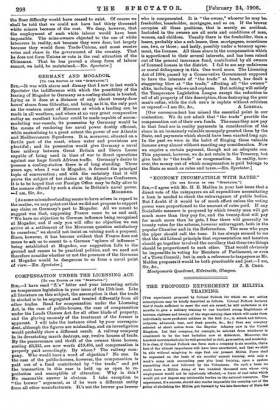THE NATIVE PERIL IN SOUTH AFRICA.
[TO TER EDITOR OF TUE "SPECTATOR."]
Sm,—Your article in last week's issue, which was so valuable in enforcing attention to this problem, emboldens me to urge what I believe to be the true solution. Johannesburg is the centre of the whole "white man's country" which represents our South African domain, and I feel convinced that the trim aim of statesmanship should 'be to make this city a great white stronghold, whose influence and power, civil aid military, would make itself felt from sea to sea, since the population it and its mines could support would afford an immense reserve, far more potent than any "foreign" garrison which we can maintain, or which it is desirable we should maintain.
The mines, properly regarded from the point of view of the statesman, and not of conflicting private interests, surely furnieh a natural attraction for labour, which should be the strength Of
the country. It is probable that in their flotation and financing their economic condition is unsound, but this fact should not he
permitted to outweigh the higher claims to be considered, in building up a healthy and powerful State. The present cost of living, too, may be high, owing much to high freights, both by sea and land, and to Protective tariffs. These causes are artificial, and could be removed.
Now, it is worth great sacrifices, if necessary, to build up on the solid foundation we have a possession worthy of our Empire.
To do this, in my humble opinion, it is necessary to regard the example of the United States of America, now being so wisely followed by Canada, and if we cannot ourselves furnish it with people, or if economic conditions do not so permit us, then to look to the enormous outflow of the surplus population of Europe, and to endeavour to direct this, primarily, to the mines. Italy
alone, which is sending forth to the Americas over a quarter of a million emigrants every year, would probably afford the most usefiil mining population • but from Russia—now, at least—it would surely be easy to attract many thousands, whose demands it would not be difficult to satisfy.
In the days when North America was sparsely populated by' a few Redskins, no man could have foreseen that it would to-day be populated with nearly a hundred million white men of great energy and the keenest intelligence, possessing wealth unsur- passed and a political influence of untold force, and growing from
day to day. Yet, with this soul-stirring example before our very eyes, not content with raking every corner of the country for its comparatively worthless natives, we seek in far Cathay the dregs of its population, and imagine a vain thing in thinking to build Empire on the sandy foundation of servile alien labour.
A great free white population, with all its industrial needs and activities, would furnish us—aye, and the rest of the world too—with enormous markets, would be the best solution of our unemployed problem, and even if it should ultimately demand
independence, would still, as does America to-day, circulate .a great trade, the life-blood of Western civilisation, in our indus-
trial veins. The endurance of this Empire depends upon new markets ; and here in Africa if anywhere, is the possibility of fostering one which might become not unlike those inspiring United States.
The native problem should be solved by a great influx of settling whites, to drive the blacks north, rather than by securing the saft4y
of a few sparse whites amidst great hordes of blacks, to whom in our folly we have added " Celestials " more easily than we shall get rid of them.
[We have always held that the paramount political con- sideration in South Africa should be the packing of the country with a white population, as far as possible of British origin. That the importation of Chinese would prevent this packing with a white population was one of our chief arguments against such importation. Under Chinese labour Boer hostility remains a difficulty. Had we thirty thousand white miners instead of sixty thousand Cbiname)), I
the Boer difficulty would have ceased to exist. Of course we shall be told that we could not have had thirty thousand white miners because of the cost. We deny, however, that the employment of such white labour would have been impossible. The mine-owners objected to the use of white labourers in reality, not because they were dear, but largely because they would form Trade-Unions, and must receive votes and share in the government of the country. That he does not form Unions or vote is the real attraction of the Chinaman. That he has proved a cheap form of labour cannot, we hold, be maintained.—En. Spectator.]











































 Previous page
Previous page